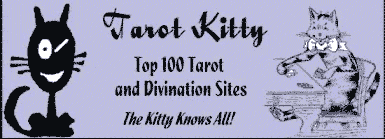
The hierophant is a card which has many many hidden meanings.
It could mean being obstructed by legal, religionous or matters concerning tradition.
It could mean family matters.
It could represent grand parents.
It could represent marriage.
It could respresent a person who is both practical and grounded in his beliefs and religious.
It could mean a matter is very traditional, old fashioned.
THE HIEROPHANT
Basic Card Symbols
Twin pillars, staff, throne, hand raised in blessing, two acolytes.
Basic Tarot Story
Having created a solid foundation on which to build his future, the Fool is struck with a sudden fear. What if everything he's worked for is taken away? Is stolen, or lost, or destroyed or vanishes? Or what if it is just not good enough? In a panic, he heads into a holy place where he finds the Hierophant, a wise teacher and holy man. Acolytes kneel before the man, ready to hear and pass on his teachings. The Fool tells the Hierophant his fears, and asks how he can be free of them.
"There are only two ways," says the Hierophant sagely, "Either give up that which you fear to lose so it no longer holds any power over you, or consider what you will still have if your fear comes to pass. After all," the Hierophant continues, "if you did lose all you'd built, you would still keep the experience and knowledge that you've gained up to this point, wouldn't you?"
This surprisingly pragmatic advise releases the Fool from his fear, and he is able exit out of the sanctuary and face the world's challenges once again.
Basic Tarot Meaning
Taurus the Earthly bull may seem an odd sign for a holy man, but it makes sense if you understand that the Hierophant's purpose is to bring the spiritual down to Earth. Where the High Priestess between her two pillars deals with realms beyond this Earth, the Hierophant (or High Priest) deals with worldly problems. He is well suited to do this because, like all Taureans, he strives to create harmony and peace in the midst of a crisis. The Hierophant's only problem is that, like the Bull, he can be stubborn and hidebound. At his best, he is wise and soothing, at his worst, he is an unbending traditionalist.
Thirteen's Observations
The Hierophant card has so many Popish trappings that it is sometimes hard for readers to like him, or interpret him as positive rather than seeing his potential for being unreasonable, hide-bound, literal and stodgy. I like to point out the decks where the Hierophant is the Oracle at Delphi or some other less loaded image.
When the Hierophant appears as a person, he's likely an old, favored teacher, therapist, counsellor, advisor, sponsor. That young Priest with progressive ideas, or the old Rabbi who was always so down to Earth and fun, or maybe an uncle who always offered such common sense advise. Unfortunately, he can also represent that nasty teacher the Querent is dealing with, the one who refuses to deviate from the text book, or a sour-faced elder who wants to keep the church old fashioned and in the dark ages.
Standing for the Querent himself, the Hierophant might well warn against being too stubborn, especially in matters of theology or ethics. It can remind the Querent what it means to be a good, and beloved teacher. In this, the Hierophant can be very positive. When things are going very wrong in the world, the Hierophant is the one who wades in, quiets the panic, and offers good, practical advise. He symbolizes a connection to the divine, which answers with a very human voice, never oblique or mysterious. You know how to solve your problem, this card says; it is not easy, not a quick fix, but it is do-able. The solution is there, you've only to bring it down to Earth.
extracted from http://www.aeclectic.net/tarot/learn/meanings/hierophant.shtml




No comments:
Post a Comment